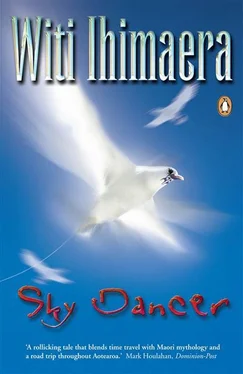“He should talk!” Huia said to Te Arikinui Korimako. “Has he looked in the river lately? Even his puku drags along the ground when he walks. It’s no wonder that he has trouble getting it up — I mean, getting his weight up into the sky —”
“Sly one,” Te Arikinui Karuwai. “Sly one.”
“Be reasonable,” Chieftain Kaka interjected. “When was the last time any of us led a raiding party on an enemy? We’ve lived peacefully all these years and we’ve lost our skills.”
“That may be true, but the seabirds won’t be as reasonable as us,” Kotuku said. “As far as I’m concerned, a long peace in our landbird history is not an acceptable excuse.”
She turned to Tui, flirting with him again.
“Kotuku is right,” Tui intoned. He lifted his voice to the assembled birds. “Let all landbird chieftains of all bird iwi and clans assign taiaha tutors to teach the ancient arts of warfare! All young men who have achieved mature feathers are to be called up. It is time for them to sharpen their beaks and claws! Time to get fit, start some serious wing ups, weight training, claw boxing, route flights and battle drills! Timata! Begin!”
Over the following week even Te Arikinui Kotuku was impressed at how quickly the chieftains achieved a level of battle readiness. But did she ever let up? She sidled up to Tui again, and honeyed words dripped from her beak. “Your leadership is of the highest quality,” she said, stroking his feathers. “You have managed to get our warriors to an acceptable military standard. But, e rangatira, you need a battle plan to go with it.”
“Who are you to tell us what we should be doing?” Chieftain Kawau interjected. “Let the men do what men do and let women do what women do.”
“Don’t be so complacent, you teke,” Te Arikinui Korimako said. “Are you so ready that you are prepared to be in the front rank? After all, it will be your lagoon over which the war will be fought.”
“I–I-I —” Kawau quailed.
“What’s your battle plan, Tui?” Te Arikinui Kotuku repeated. “What sophisticated military techniques and stratagems are you going to deploy?”
Tui saw her point. He turned to his other chieftains, Titi and Kaka in particular, and gave them a withering look. “Hoi! Do you fellas think we can just turn up at the battlefield and expect our superiority to win the day? And what is that superiority anyhow? If any of you think that the seabirds will recognise our divinity, our mana and our chiefly status and retreat, think again. They won’t, and we all know it.” Tui puffed out his lacy collar and the double tuft of curled white feathers at his throat. “Kotuku is right,” he said. “We need a plan.”
There was a rustle in the trees and Chieftain Ruru came flying into the discussion. You think his going to sleep during the day was a natural inclination? Get a grip. It was all because of boredom. Ruru relished the idea of a battle. “Did somebody mention my name?” he asked.
“So it was,” Hoki said, “that guided by Te Arikinui Kotuku’s cool and measured hints the landbirds were able to set up their defensive system — and they had a battle plan to go with it.”
Worked out by Ruru, the plan called for the strongest landbirds to lead a defensive war party. Chieftain Kahu, of course, was Chieftain Tui’s left hand man and Second in Command. Among the other leaders were Chieftain Kuku of the pigeon clan, Chieftain Kaka of the parrots and Chieftain Kokako of the crows. Chieftain Pitoitoi was assigned to forward sentry duty. Straws were drawn for the great honour of sending out the three challengers in the first battle against the seabirds. The honours went to Chieftain Koekoea of long-tailed cuckoos, Chieftain Piwakawaka of fantails and, joy of joys, Kahu himself.
“A strong team,” Tui approved. “Solid. Ace.”
With increasing confidence, the landbirds practised their drills. All the while, far off, they could see the seabird ranks circling above the offshore islands and hear the savage chants and haka coming across the sea.
One afternoon, the chanting of the seabirds stopped.
An uneasy silence fell across the Great Forest.
“Well, boys,” Tui said. “I think the time’s come, ready or not. We should expect a dawn attack. Let everyone be in their positions. Is everybody clear on the battle plan? The war party will be at the forefront of the defence against the seabird army. They will engage the seabirds and then —”
At that moment, Hoki’s lesson was interrupted by a flash of sunlight. She shaded her eyes and looked down from the clifftop to Manu Valley below. A car was coming up the valley road. Cora, returning home after her rehearsal.
“And then?” Skylark asked. She didn’t want Hoki to stop telling the story of the war. But the mood was broken.
“We’d better get back home,” Hoki answered. “Your mother will worry about where you are. We’ll resume the story later. And by the way —”
“Yes?”
Hoki looked at the sacred tree. Rebellious, Skylark followed her gaze — and took a step back. For the first time she felt the mana and power of the tree. She saw it with new eyes, glowing, utterly commanding, and she felt she should kneel before it.
“You should never have followed me up here,” Hoki said. “Only a few people know of the tree’s existence. We who have guarded it all these years have a commitment to defend it unto the death. On no account must you come up here without my and Bella’s express permission.”
“You still haven’t told me about the heliacal rising of the planet Venus,” Skylark called as Hoki started her walk back down the track. Did Hoki really think she would let her get away so easily? No way.
Hoki stopped. “I was afraid you would ask me that,” she said. “It’s a special conjunction of the rising of the sun with the appearance of the planet Venus. Only at such conjunctions can extraordinary events beyond human understanding occur. All ancient cultures who watch the skies for new stars, comets and any astronomical disturbances to time and space know this.”
“When is it supposed to happen?” Skylark asked.
“Actually, Skylark, in two days’ time.”
Skylark became very cross. “Well don’t look at me,” she said. “I’m just here with my mother on holiday.”
That night, Skylark dreamt of the tree. It looked like the claw of a bird. When she looked again, the tree turned into Hoki’s withered left foot. Then the tree caught fire, and Hoki’s claw curled into itself, grabbing at the sky.
— 1 —
With a start, Skylark awoke to a red sky.
The manu whenua were rising to the penultimate dawn. Their song was a brilliant, shining cantilena, soaring across Manu Valley. This morning, however, the song was sharp, uneasy, shrill, like stones being scraped together.
Skylark’s memory immediately turned to Hoki’s words. One day to go to the heliacal rising of Venus. She flung the blankets off her bed and stepped to the window. “Read my lips,” she shouted to nobody in particular. “Not my problem, okay?”
“Oh why did I ever agree to go back to show business?” Cora asked.
The landbirds weren’t the only ones feeling fractious that morning. So was Cora, having second thoughts about Bye Bye Birdie opening that very evening. She sat on a lounger in the sun drinking cup after cup of coffee, trying to learn her lines. She’d die of lung cancer or drowning one way or another.
“I’m never going to be ready in time. Really, Skylark honey, it’s all your fault. You should have stopped me from saying yes.”
“Can’t you just relax and enjoy the view?” Skylark said between gritted teeth. “Can’t you forget the show for a moment?” Skylark had decided that today she was going to be just a tourist.
Читать дальше












